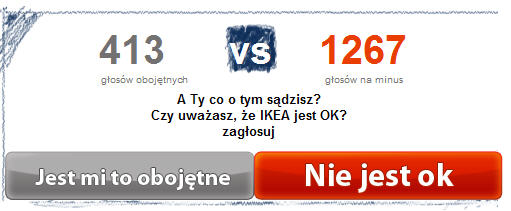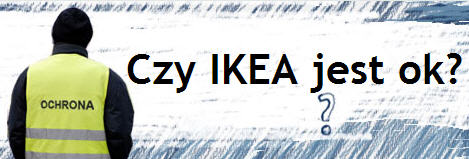On Nov. 3, I noticed that a new Twitter account was following me on that microblogging site, and its name intrigued me: @czyIKEAjestOK [is IKEA OK?]. It turns out that the account set up only a day before, on Nov. 2, belongs to an initiative of Polish citizens who work for IKEA via another, smaller, company called Solid Security, and who claim to be mistreated by those. They claim to be earning amounts below the national minimal wage, being assigned to work up to 16 hours daily and lacking the basic benefits, as we read on their Facebook page [POL]:
Our employers lower our wages, but also make us sign fictional contracts depriving us of the basic rights like annual leave or sick leave benefits.
When representatives of the employees entered IKEA building to turn in a copy of their petition containing the above-mentioned issues and signed by all of the affected, hoping to be able to talk to an IKEA spokesman, they were asked to leave the building by the head of security himself. This situation was filmed and is available on all of their social media sites.
The initiative's blog explains the main question they are raising via the on-line campaign [POL]:
We work for IKEA, but officially we are employed by another company. We earn low wages, we have no social fund. Buying medicine, illness is a financial catastrophe for us. IKEA washed their hands off it – officially they are not responsible. Is this OK?
It also hosts a voting where you can choose between ‘I am not bothered’ and ‘ I think it's not OK’ options.
 ‘And you, what do you think? Do you think IKEA is OK? Have your say:
‘And you, what do you think? Do you think IKEA is OK? Have your say:
I am not bothered. / It's not OK.’
On their site, in the FAQ section, we find a reason why the citizens have decided to contact IKEA directly to address their issues [POL]:
Of course we wanted to talk to Solid Security, the company which employed us, first, but we were ignored. Solid are aware of their position and the advantage they have over their employees, so any conversation is very difficult. That's why we decided to seek support at the company that pays Solid and thus can have a huge impact on their operations.
This initiative was picked up by a few on-line news portals, and was described by Interaktywnie.com (a Polish social media marketing portal) in a news article, where commentators praised the neat build-up of the on-line campaign. Generally, however, there is a small amount of reactions on-line, which focus mainly on questioning why IKEA was targeted instead of Solid Security, pointing out that no-one is forced to work there, and waiting to see how the initiative develops.
On a portal dedicated to the industry news, Abenador states [POL]:
I have no idea if IKEA is OK or not, but when it comes to work conditions at SOLID, their employees should talk to … SOLID. Including IKEA in this argument is probably unnecessary and makes no sense (they are not the employers).
Aaa2 responds to this on a different forum [POL]:
Of course the employees did go to SOLID, too. IKEA is one of the largest clients of Solid and it is also said to be socially responsible. It cannot avoid the responsibility for employees working on their grounds, if it is so sensitive socially.
Dink points out in a board discussion:
work at IKEA is not mandatory
On Wykop (a Polish version of Digg.com), crea says [POL]:
I must say it's not a good situation…but it's a corporation, so it will be difficult to win with them..
Przemek postshis opinion on an HR portal:
As I understand, Mr Roman and his company do understand the amount of brand damage they are causing… But it's not the scale of brand damage which requires serious treatment of similar cases. I will watch with interest how this case develops, mainly in the social media.
This action conduced mainly via social media channels with usage of both visual and textual content grows in followers on Twitter, Facebook and in views on YouTube, as well as in numbers of votes on the main site. Representatives of Global Union from Sweden, USA, Italy, Ireland, Holland and other countries have expressed their concerns about the case of the Polish employees in a document published on Facebook. After four weeks since the original incident, both companies remain silent.







